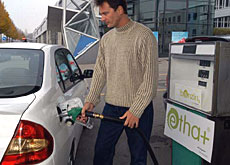
Cars gear up to run on farm waste

Swiss cars could soon be running on a fuel based on agricultural waste, thanks to a project promoting essEnce5 – a mixture of bio-ethanol and petrol.
The government – which favours the use of cleaner fuels – has decided not to tax the bio-ethanol produced in the project, called etha+.
“When it comes to the production of biofuels, Switzerland lags far behind, even if the country is waking up,” said Thomas Schmid, from the Swiss Farmers Union.
Alcosuisse, a division of the Swiss Alcohol Board, has announced plans to build the first bio-ethanol production plant in Switzerland by 2008.
Annual production of bio-ethanol, which reduces the polluting effects of petrol, should reach 45 million litres.
“Bio-ethanol is an ideal product because it can be made commercially available immediately, without having to modify petrol stations and vehicles,” alcosuisse director Pierre Schaller told swissinfo.
The etha+ project consists of adding five per cent ethanol to conventional petrol. Alcosuisse says the resulting essEnce5 mixture has two main benefits: it reduces both the consumption of fossil fuels and the emission of greenhouse gases.
Ambitious
essEnce5 should be on the market by the beginning of next year but the project’s overall – and ambitious – aim is to replace all petrol sold in Switzerland with essEnce5 by 2010.
Schaller says that the price of the new fuel would be similar to current petrol prices or maybe “a few centimes more expensive”.
essEnce5 is already in use in several other countries, including Brazil, the United States and Sweden.
But the Swiss pilot project is unique thanks to its “multi-raw-material” plant. This means that ethanol will be produced from a variety of agricultural products, ranging from downgraded potatoes and beet molasses to flour mill waste and diary by-products.
The Swiss petroleum association has expressed support for biofuels. Director Rolf Hartl says that these fuels are considered to be among the most attractive alternatives to petrol, especially as they do not harm car engines.
“Carmakers and importers say that up to five per cent bio-ethanol represents no problem,” said Hartl.
Boost
essEnce5 received a boost last month after the government decided to grant a tax exemption to bio-ethanol produced during the project.
The exemption may also be included in the revision of the law on the taxation of mineral oils, which is currently in its consultation stage.
“The revision of the law on the taxation of mineral oils anticipates a tax exemption for biofuels,” said Lukas Gutzwiller from the Federal Energy Office.
alcosuisse’s Schaller says that this is a sign that the government is committed to promoting the use of bio-ethanol.
The government has previously stated that it favours clean fuels as a way of reducing carbon dioxide emissions from road traffic.
Kyoto
Switzerland has signed the Kyoto Treaty, which is aimed at reducing the amount of CO2 emissions worldwide by ten per cent below their 1990 levels by 2010.
According to Schaller, that is good news for the etha+ project.
“By adding five per cent bio-ethanol to traditional petrol, we can reduce CO2 emissions by 4.5 per cent,” he told swissinfo.
The director of alcosuisse added that if essEnce5 were to be used countrywide, it would reduce CO2 emissions by 600,000 metric tons – which would go a long way in helping Switzerland meet its Kyoto targets.
Biofuel production could also help the country’s struggling farmers. The Eco Energie Etoy cooperative in canton Vaud has been successfully producing bio-diesel from colza oil for eight years.
The Swiss car importers association says that, faced with rising petrol prices, more people are choosing diesel in Switzerland.
Figures from the Association show that in the first nine months of 2004, 27 per cent of vehicles sold were diesel.
swissinfo, Luigi Jorio
The initial phase of etha+ should produce 900,000 litres of essEnce5, or 20% of Swiss petrol needs.
16.7 million metric tons of CO2 emissions in Switzerland are linked to fuels.
1.36 litres of oil are needed to produce one litre of petrol.
But one litre of ethanol can be produced from 0.33 litres of raw materials.
Ethanol is normally consumed in the producing country and only 10% per cent of the production worldwide is exported.
Switzerland imports two-thirds of its ethanol from Brazil, South Africa and the US.
5% ethanol can be added to conventional petrol, making it cleaner. No vehicle modifications are needed.

In compliance with the JTI standards
More: SWI swissinfo.ch certified by the Journalism Trust Initiative


























You can find an overview of ongoing debates with our journalists here . Please join us!
If you want to start a conversation about a topic raised in this article or want to report factual errors, email us at english@swissinfo.ch.